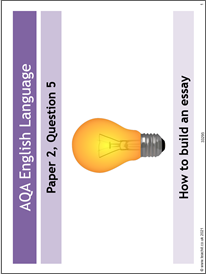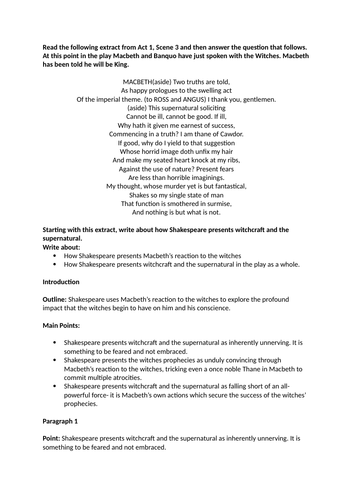Essay Writing Tips
There are many key writing techniques required to achieve the best grades.
The video and text below look at some of the best technigues to help you achieve top marks
What are these techniques?
Introduction
- Remain focused on the question
- Clear conclusion
- Organisation/ paragraphing
Good essay practice should include:-
- Make sure you write a brief plan for your answer. In your plan you should identify very clearly around six distinct points you intend to make and the specific parts of the text that you intend to examine in some detail.
- Spend about 5 or 10 minutes planning as this will help you make sure you have chosen the right question (because then you know you have lots of material to cover).
- This should be brief; you could include what your main view is and what other ideas you have.
- Don't list the poems or ideas you are going to include in the rest of your essay as you will be repeating yourself.
- Don't begin with ‘In this essay I am going to ...' and then list ideas.
- Try to begin by addressing the question straight away.
Paragraphing
- Make sure you use them as it makes your writing clearer for you and the examiner.
- When writing your essay you should devote one or two paragraphs to each idea from your plan. Try to make smooth links between paragraphs.
- When you make a point - you must give evidence to prove it. When you make a point, refer to the text and give an example to back up what you say. The best way to do this is to use a quotation from the text.
- Remember to include quotations, but not too many and don't make them too long. A good quotation can be a line or two long or just a few words from a line.
- Do not copy out whole long sections from texts as this is wasting time.
- Don't retell the plot of the story. The important thing is to be selective in the way you use the text. Only refer to those parts of the book/poem that help you to answer the question.
Answer the question
- It sounds obvious, but it's so easy to forget the question and write the essay you did in the mock. When you have finished a paragraph read it through and ask yourself. "Am I still answering the question?" If you think you are not then you need to change it, so that you are still focussed.
- At the end, try to draw all the strands of your various points together. This should be the part of your essay that answers the question most directly and forcefully. Keep checking the question.
- Keep it formal. Try to avoid making it chatty, so avoid using abbreviations e.g. ‘don't', ‘won't' and do not call writers by their surnames so for William Golding you should call him Golding rather than William, which is too informal.
Be creative
- Remember you do not have to agree with other people's points of view about literature. If your ideas are original or different, so long as you develop them clearly, use evidence intelligently and argue persuasively, your point of view will be respected. We want literature to touch you personally and it will often affect different people in different ways. Be creative.
- There is no one correct answer to questions on English Literature, just well explored and explained ones.
CHECKLIST AFTER WRITING YOUR ESSAY
- Written a plan and stuck to it?
- Written in clear paragraphs?
- Produced evidence to prove all your points?
- Used quotations from your chosen text(s)?
- Answered the question?
Generally speaking to get good marks you have to do the following:
To get a grade 9 or A* you need to be insightful, sensitive, convincing and evaluative.
For a grade 7/8 or A you need to be analytical and exploratory.
For a 6 or B you need to sustain your answer linking details to what the writer is trying to say and thoughtfully consider the meanings of the texts.
For a 4/5 or C you need to structure your answer to the question, use details effectively to back up your ideas and make some appropriate comment on the meaning of the texts.
For a 3 or D you need to answer the question and explain your ideas with some supporting quotations from the text.



Planning Essays

Before beginning any essay, you must always plan the content of the essay. A sufficient plan leads to an effective structure and content. With a plan, your writing appears concise and to the point; without one, you risk your writing appearing inconsistent and confusing. Although different types of essays require different types of planning, the first thing you should always do when opening your exam paper is read the question first . You must have a clear idea of what is being asked of you before you begin planning your essay or analysing any text. This will save you a lot of time in the exam, especially during the analysis questions as it will avoid you having to reread the text.
In each large essay question in the exam you are recommended to spend only five minutes planning your essays, and so reading the question first will save valuable time for you in the exam.
In this chapter, we will only discuss the planning required for questions 3 and 6 of Section A. The last question of Section A (question 7) is a comparison question and so we will discuss this individually in the next chapter.
Questions 3 and 6 of the exam are short essay questions compared to the last three in the exam. Questions 3 and 6 are worth 10 marks each and solely focus on AO2:
- AO2 – Understand and analyse how writers use linguistic and structural devices to achieve their effects (makes up 20% of the overall exam).
You only need to comment on how the writer has used linguistic and structural devices to achieve their effects . The types of questions you may come across in this aspect of the exam are:
- Describe how the writer expresses his thoughts and feelings about his trip to America.
- How does the writer present her opinion on the state of UK politics?
Because these are shorter exam questions you are not expected to spend a whole five minutes planning these; however, a plan is still necessary and essential.
After reading the question carefully and picking out important aspects of it (like discussed in the previous chapter), there are a number of ways you can organise your ideas for a plan. Bullet points, for example, are good for planning and will not take up too much time. However, some students prefer to be more creative and create mind-maps for a plan as they find this an easier way to organise their thoughts. Mind-maps are not recommended for questions 3 and 6 of Section A so stick to bullet points; we will discuss the uses of mind-maps in Unit 3 of this course.
In order to illustrate planning essays, we will use the same essay question ‘How does the writer describe their thoughts and feelings about their trip to Paris?’ and the previous extract we looked at:
After thoroughly analysing the question being asked, you can just use bullet points to design your plan; however, it is a good idea to use a P E E table to plan your essays as this will ensure you properly evidence and explain your points:
Here is an example of a completed table:
Every essay should include:
- An introduction (to introduce the essay and any points that will be made)
- main body (your main points that you use to answer the question)
- conclusion (summarise your main points – it is a good idea to refer back to the question here)
Although this essay is fairly short, you must still include an introduction and conclusion. An example of how you might introduce the essay we have just planned is:
“The writer of ‘A Trip to Paris’ describes their thoughts and feelings about their trip using a number of linguistic and structural devices to achieve their effects. The writer is intending to inform the reader about their trip to Paris but the text has a satirical overtone which is created by the devices they use.”
After you have written the introduction you should then go on to explain the main points outlined in the plan you created.
Noticed how in the introduction we not only referred to the question being asked: ‘How does the writer describe their thoughts and feelings about their trip to Paris?’ but also the Assessment Objective that the examiner will be using to mark this question: ‘AO2 – Understand and analyse how writers use linguistic and structural devices to achieve their effects (makes up 20% of the overall exam)’.

Interested in an English GCSE?
We offer the Edexcel IGCSE in English Language through our online campus.
Learn more about our english GCSE courses
Read another one of our posts
Understanding dementia: types, symptoms, and care needs.

How GCSE Business Prepares You for Real-World Entrepreneurship

Preparing for a Career in Adult Social Care: What You Need to Know

Parent’s Guide to Supporting A-Level Students

The Importance of Compassion in Healthcare

The Role of Palliative Care in End of Life Care

Community Health Initiatives – Promoting Wellness Locally

Caring for Older People – Strategies for Providing Quality Senior Care

Save your cart?
How should I plan my English essays?
Lots of students find planning daunting, or think it's unnecessaryt. In fact, it's the most important part of the essay process. Once you've nailed the steps, you've unlocked the key to controlled, thoughtful, and efficient essays that will get you the grades you're aiming for. Firstly, the essay title (or essay question) is your focus. Write it out and circle the most important words - these will probably be words like "how", "significant", "dramatic", "explore" "different", and of course the texts and/or themes that the question asks you to discuss. Now, treat each circled word as a mini spider diagram. Draw arrows from each, brainstorming the words and the ways in which a writer explores or presents a text or theme, and then more arrows stemming from each of these points with direct quotes, always paired with relevant close analysis (literary techniques like metaphor and alliteration).
Once you've done all this, you have everything you need to write your essay. All that's left to do now is to gather your quotes and notes and divide them into three main points. This can be done chronologically, but often works better if you group them thematically - for example:
Shakespeare makes this a significant moment in 'The Tempest' through Ariel's unusual dialogue.
Shakespeare makes this a significant moment in 'The Tempest' through his use of stage directions and non-verbal effects.
Shakespeare makes this a significant moment in 'The Tempest' by creating tension in the dialogue between Prospero and Ariel.
It's effective if your final point differs in argument from the first two, to give your essay shape and your conclusion relevance. So that's how you write a GCSE English essay plan - with practice this can be done in just ten minutes!
Related English Literature GCSE answers
How can i effectively conclude a gcse level essay, how would you answer this question: compare the ways in which the writers of your two chosen texts present the effects of social convention on characters, how important is the bunkhouse as a setting in of mice and men, 'first impressions are very significant in pride and prejudice.' how far do you agree with this view, we're here to help, company information, popular requests, © mytutorweb ltd 2013– 2024.
Internet Safety
Payment Security
Resources you can trust
How to build an essay

A useful introduction on how to build and plan a formal essay, focused on AQA English Language GCSE English Language Paper 2, question 5. Uses a sample essay title on gender and equality and provides a planning template for students.
Sample content:
How do you build an essay?
- Thesis - your view: established in the introduction, built upon throughout and developed.
- Antithesis - different views which you can critique throughout the essay, at appropriate points.
All reviews
Have you used this resource?
Resources you might like
- Primary Hub
- Art & Design
- Design & Technology
- Health & Wellbeing
- Secondary Hub
- Citizenship
- Primary CPD
- Secondary CPD
- Book Awards
- All Products
- Primary Products
- Secondary Products
- School Trips
- Trip Directory
- Trips by Subject
- Trips by Type
- Trips by Region
- Submit a Trip Venue
Trending stories

Top results

- How To Get Gcse Students To Plan And Write English Literature Essays That Fully Demonstrate Their Understanding
How to Get GCSE Students to Plan and Write English Literature Essays that Fully Demonstrate their Understanding

“Why on earth have they included that quote, when this one would clearly have been a much better choice?” Sound familiar? Here's how students can avoid this and other issues, says Fiona Ritson…

A full set of resources to accompany this feature can be downloaded for free here.
Calling all English teachers: does this sound familiar? You’ve read a GCSE text with your class, and used resources you’ve painstakingly made in order to get them thinking more deeply.
As you go through extracts in the last lesson on Friday afternoon, you ask carefully crafted questions, and note with satisfaction how students shoot their hands up in a flash, like Barry Allen on the run.
You collect a pile of books containing essays, and plonk them in the boot of your car, smiling at the moments of brilliance you expect to see in your students’ work. Later, back at home, you mark them. And that’s when your world comes to an abrupt stop.
What went wrong? Because what you are seeing doesn’t remotely resemble what you taught – were you even in the room? Why on earth have they included that quote, when this one would clearly have been a much better choice, leading to some fantastic analysis?
Could it be… because you didn’t actually prepare them properly for what they needed to do?
All the way
Despite timetable constraints and pressure for schools, I strongly advise reading any GCSE text cover to cover with students.
This may sound obvious – but, blasphemous though many will find it, I’ve heard rumours of schools simply handing out extracts with summaries to bridge the gaps in missing knowledge and content.
However, the only way students will be able to write articulate essays is if they know the text inside out.
Moreover, whether we like it or not, pupils need to understand the exam specification. This doesn’t mean teaching to the test, but they do need to know what to do so that they can move up the levels on a mark scheme, and this means recognising the language of that mark scheme.
Each exam board uses the same Assessment Objectives, but they’re weighted differently across the two papers for each board. Some need context, some are a comparison, and so on. You and your students should know them inside out.
Plan, plan and plan!
For the English literature GCSE exam, students have to write an articulate essay to an unseen question, sustained over the whole piece, in about 30-60 mins (depending on question/exam board), showing clear understanding of the text and context, all whilst under pressure.
As teachers, we have to prepare them as much as possible. Five minutes planning an essay could ensure students don’t go off track because they’ve lost the question focus.
And teaching how to write effective introductions helps pupils not only to focus the start of the essay, but also to shape the direction and their ideas for the rest of their response.
Students need to consider the question, character or theme, at all times. A literature exam will always consider what the text is about, for example the actual content and themes or ideas the author is exploring.
The other consideration is how the text is written – so, the techniques used by the author through language, structural features, setting, characters etc. These are the key elements pupils should be covering in their responses:
- Character Students need to consider a character from many viewpoints; are they liked/disliked, and why are they important to the novel/plot? Is there a theme explored through a particular character? How do we feel as a reader towards them? How are they treated by other characters? And finally, do they change – do they learn anything across the story?
- Themes Learners must understand the themes explored in a text and how they are linked to the characters and storyline, as well as contextual information at the time of writing.
- Language This should be the easiest, the words on the page, but often students move swiftly past words or phrases, focusing on quotes that lead to poor analysis. Students need to look for key words/phrases that answer the question. I’ve used a simple system for years. When I read the extract I begin to underline words or phrases that jump out at me. Once I see a pattern, repetition, synonym or even antonym of a previously underlined word I circle it. This means when I get to the end I can quickly see key words/phrases and patterns across the text. However, regardless of any little tricks they might use, students need to actually analyse the quote/words they’ve picked for meaning!
- Techniques Sometimes we get students to analyse language but for them the technique is an afterthought. Why did an author pick a metaphor or oxymoron at that point, how is that technique effective and, for example, how does the comparison add to overall meaning?
- Structure/form Analysing structure seems to present students with an especial challenge. They need to consider paragraphs, sentence types, punctuation, word order, clause order and how the extract begins and ends. How does the genre of the text add to meaning or contribute to author’s intent? Does the extract follow a particular character’s thoughts or feelings and if so why; and more importantly, do they change over the extract?
- Narrator Here, students need to look for shifts in tone, subtle choices made by the author that carry as much impact as the words. Who is speaking and why? How does this add to overall meaning?
- Setting Where is the extract or that section set, why is that important? How does it add to the atmosphere? Does it change the way characters think or feel? I always advise students to pick around eight to ten quotes from across the extract or whole text covering language, techniques and structure – and remind them constantly that it’s not enough just to include a quote; they need to explain why it’s significant, too!
Finally, of course, students need to finish their essay with a conclusion that summarises the author’s intent covering the question and their initial introduction.
3 Sources of support
For further help and guidance, try the following:
- Read Bringing Words to Life (Isabel L Beck, Margaret G McKeown, Linda Kucan) and Closing the Vocab Gap (Alex Quigley) if you haven’t already. Students need to understand tier two language; how to write about it and how to analyse it. They need to signpost their essay making strong connections in the extract or whole text.
- Get yourself on Twitter and find the English community using the #teamenglish hashtag, where teachers up and down the country share resources and their time freely.
- Sign up to Litdrive, a free site for English teachers to share resources.
Fiona Ritson is an English teacher in the South East of England. Find her on twitter, @AlwaysLearnWeb , where she regularly shares KS3 and 4 resources with #TeamEnglish . Browse great ideas to help with GCSE English Language revision .
Sign up to our newsletter
You'll also receive regular updates from Teachwire with free lesson plans, great new teaching ideas, offers and more. (You can unsubscribe at any time.)
Which sectors are you interested in?
Early Years
Thank you for signing up to our emails!
You might also be interested in...

Why join Teachwire?
Get what you need to become a better teacher with unlimited access to exclusive free classroom resources and expert CPD downloads.
Exclusive classroom resource downloads
Free worksheets and lesson plans
CPD downloads, written by experts
Resource packs to supercharge your planning
Special web-only magazine editions
Educational podcasts & resources
Access to free literacy webinars
Newsletters and offers
Create free account
By signing up you agree to our terms and conditions and privacy policy .
Already have an account? Log in here
Thanks, you're almost there
To help us show you teaching resources, downloads and more you’ll love, complete your profile below.
Welcome to Teachwire!
Set up your account.
Lorem ipsum dolor sit amet consectetur adipisicing elit. Commodi nulla quos inventore beatae tenetur.
I would like to receive regular updates from Teachwire with free lesson plans, great new teaching ideas, offers and more. (You can unsubscribe at any time.)
Log in to Teachwire
Not registered with Teachwire? Sign up for free
Reset Password
Remembered your password? Login here

How to Write an English Literature Essay?
In A-Level , GCSE by Think Student Editor August 26, 2022 Leave a Comment
Writing an English literature essay can be very stressful, especially if you have never had to write an essay for this subject before. The many steps and parts can be hard to understand, making the whole process feel overwhelming before you even start. As an English literature student, I have written many essays before, and remember how hard it felt at the start. However, I can assure you that this gets far easier with practice, and it even becomes fun! In this article, I will give you tips and tricks to write the best essay you can. As well as a simple step-by-step guide to writing one that will simplify the process.
Writing an English literature essay has 3 main parts: planning, writing and editing. Planning is the most important, as it allows you to clearly structure your essay so that it makes logical sense. After you have planned, write the essay, including an introduction, 3-4 main points/paragraphs, and a conclusion. Then check through the spelling and grammar of your essay to ensure it is readable and has hit all of your assessment objectives.
While this short explanation of the process should have given you an idea of how to write your essay, for key tips and tricks specific to English literature please read on!
Table of Contents
How to plan an English literature essay?
The most important thing in any English essay is the structure. The best way to get a logical and clear structure which flows throughout the essay is to plan before you start . A plan should include your thesis statement, 3-4 main paragraph points, key context and quotes to relate to.
A common way of structuring a plan is in the TIPE method. This involves planning each of your main points and sections on a few lines, in the structure of the main essay, making it easy to write out. Always highlight the key word in the question before you start planning, then also annotate any given extracts for ideas. If you have an extract, the main focus of your essay should be on that.
Planning should take around 10-15 minutes of your exam time for essay questions. This sounds like a lot, but it saves you time later on in writing, making it well worth the effort at the start of an exam.
Start each plan with a mind map of your key moments, quotes, context and ideas about the exam question theme, character, or statement. This helps you get all of your ideas down and figure out which are best. It also creates a bank to come back to later if you have extra time and want to write more.
Once you have created your mind map, find a thesis statement related to the question that you have 3-4 main points to support. It can be tempting to write lots of points, but remember, quality is always better than quantity in English Literature essays.
A useful method to help you plan is by creating a TIPE plan. With the following bullet points, you can now begin your own TIPE plan.
- Introduction
- Points – you should have 3-4 key paragraphs in your essay, including relevant quotes with analysis (and techniques the author is using) and context for each point
- Ending – conclusion
How to write an English literature essay introduction?
Depending on what level of literature essay you are writing, you will need different parts and depths of content . However, one thing that stays fairly consistent is the introduction. Introductions should hook the reader , literally “introducing” them to your essay and writing style, while also keeping them interested in reading on.
Some people find it difficult to write introductions, often because they have not already got into the feeling of the essay. For this, leaving space at the top of the page to write the introduction after you finish the rest of the essay is a great way to ensure your introduction is top quality. Writing essays out of order is ok, as long as you can still make them flow in a logical way.
The first line of any introduction should provide the focus for the whole essay. This is called a thesis statement and defines to the examiner exactly what you will “prove” throughout your essay, using quotes and other evidence. This thesis statement should always include the focus word from the question, linked to the view you will be arguing.
For example, “Throughout Macbeth, Power is presented by Shakespeare as a dangerously addictive quality.” This statement includes the play (or book/poem) title, the theme (or other element, such as the name of a character) stated in the question, and the focus (addiction to power). These qualities clearly show the examiner what to expect, as well as helping you structure your essay.
The rest of the introduction should include a brief note on some context related to the theme or character in question, as well as a very brief summary of your main paragraph points, of which there should be 3-4. This is unique to each essay and text and should be brief points that you elaborate on later.
How to structure an English literature essay?
As already discussed, the plan is the most important part of writing an English literature essay. However, once you start writing, the structure of your essay is key to a succinct and successful argument.
All essays should have an introduction with a thesis statement, 3-4 main points, and a conclusion.
The main part of your essay, and the most important, is the 3-4 main points you use to support your thesis. These should each form one paragraph, with an opening and a conclusion, almost like a mini essay within the main one. These paragraphs can be hard to structure, so many students choose to use the PETAL method.
PETAL paragraphs involve all of the key elements you need to get top marks in any English literature essay: Point, Evidence, Techniques, Analysis and Link.
The point should be the opening of the paragraph, stating what you are looking at within that section, related to your thesis, for example, “Shakespeare uses metaphors to show how the pursuit of power makes Macbeth obsessive and tyrannical”. Then, use a key moment in the play to illustrate the point, with a quote.
Choosing quotes is hard, but remember, quotes that are short and directly related to your thesis are best. Once you have chosen a quote, analyse it in relation to your point, then link to the question. You should also include some context and, at A-Level, different viewpoints or critics.
After these points, you should always include a conclusion. Restate your thesis, introduction and each point, but do not introduce new ideas. Explain and link these points by summarising them, then give your overall idea on the question.
If you have time, including a final sentence about wider social impacts or an overarching moral from the book is a good way to show a deep and relevant understanding of the text, impressing the examiner.
How to write an English literature essay for GCSE?
Marking for GCSE English Literature essays is done based on 4 assessment objectives. These are outlined in the table below. These are the same across all exam boards.
If you follow the structure outlined above, you should easily hit all of these AOs. The first two are the most important, and carry the most points in exams, however the others are what will bring your grade up to the best you can, so remember to include them too.
Context, or AO3, should be used whenever it is relevant to your argument. However, it is always better to include less context points on this than to try and add random bits everywhere, as this will break the flow of your essay, removing AO1 marks. For more information about the assessment objectives for GCSE English Literature, check out this governmental guide .
For more information on GCSEs, and whether you have to take English literature, please read this Think Student guide.
How do you write an English literature essay for A-Level?
Similarly, to GCSE, all A-Level papers are marked on a set of assessment objectives which are also set by Ofqual, so are the same for all exam boards. There are more than at GCSE, as A-Level essays must be in greater depth, and as such have more criteria to mark on. The table below shows the assessment objectives.
AO1 and AO2 are very similar to GCSE, however the writing needed to achieve top marks in them is much harder to reach. It must be very detailed and have a clear, distinct style to reach high marks. These skills are developed through practice, so writing lots of essays over your course will help you to gain the highest marks you can here.
AO3 and AO4 often go together, as literary and historical contexts. AO3 is again similar to GCSE, but in more depth. However, AO4 is new, and involves wider reading around your texts. Links to texts from the same author, time period, or genre make good comparisons, and you only need to make one or two to get the marks in this section.
AO5 is also one of the harder sections, which involves considering interpretations of the text that may not have been your first thought, and that you may not agree with. This can elevate your essay to much higher marks if you can achieve them.
One of the best ways to get AO5 marks is to look at critics of the book you are studying. These are academic views, and to remember quotes from them to put in when they are relevant. For more information about the assessment objectives for A-Level English Literature, check out this guide by AQA.
Which GCSE and A-Level English Literature papers have essay questions?
All GCSE and A-Level English Literature papers will have at least one essay question. Essay questions are usually the longest answers in the paper. However, sometimes other questions may require an essay style format but shorter. The exact structure of the exam paper and where essay questions are will depend on which exam board your GCSE or A-Level qualification is with .
GCSE English Literature paper 1 usually requires 2 essays . Each question in this paper is an essay, and each has an extract to be based around, so focussing your analysis on that extract is the easiest way to get marks.
The marks for these essays vary depending on exam board . However, as they are assessed on the objectives above, you don’t need to think too much about the marks, as it does not work in the same way as other subjects with a mark per point made. Instead, essays are marked cumulatively based on the general level of discussion achieved.
GCSE English Literature paper 2 usually requires 3 essays , one in each section. Sections A and B are an essay each, without an extract, then section C involves a shorter essay on unseen poetry and a short answer question. This type of question is harder, as you have to really know the book you are studying in order to get a good mark and include enough quotes.
A-Level English Literature is based entirely on essay questions. The questions are based on poetry, novels and plays, some seen and some unseen. About half of the essays have an accompanying extract, however you are expected to have very good knowledge of your texts even for extract questions, so do not rely on extracts for quotes and marks.
The information above is mainly based of the AQA exam papers, which you can find the specifications to for GCSE and A-Level by clicking here and here respectively. While this is mainly based of AQA, the exam boards all have rather similar structures and so you will still be able to use this information to get a rough idea.

Top tips for writing the best essay you can in English literature
This section will provide you with some tips to help you with your English literature essay writing. I recommend you also check out this Think Student article on how to revise for English literature. Now without further hesitation, lets jump into them.
Focus on the structure of your English literature essay
A logical and clear structure is key to allowing your essay to stand out to an examiner. They read hundreds of essays, so a good structure will let your creative analysis shine in a way that makes sense and is clear, as well as not confusing them.
The arguments you make in the essay should be coherent, directly linked to the question, and to each other. The easiest way to do this is to ensure you properly plan before you start writing , and to use the acronyms above to make the process as easy as possible in the exam.
Always use examples and quotes in your English literature essay
For every paragraph you need to have at least 1, if not more quotes and references to sections of the text . Ensure that every example you use is directly relevant to your point and to the question. For example, if you have a question about a character in the play, you should use quotes from or about them, rather than quotes about other things.
These quotes should always be analysed in detail, however, so do not use more than you can really look at within the time limit. Always aim for quality over quantity.
Leave time to edit and re-read your English literature essay
After you are finished writing, go back and re-read your essay from start to finish as many times as you can within the exam time limit. Focus first on grammar and spelling mistakes, then on general flow and coherency. If you notice that you have gone off topic, remove the sentence if you can, or edit it to be relevant.
Remember, the most important thing in the exam is that your text makes sense to the reader , so use concise, subject specific terminology, but not unnecessarily. You do not need to memorise big technical words to get good marks, as long as you can say what you mean.
Read other people’s English literature essays
One of the least understood tips for getting good marks at GCSE, A-Level and beyond is to read other people’s essays . Some students feel like reading exemplar essays or essays their classmates have written is cheating, or that it would be stealing their ideas to read their essay. However, this is not the case.
Reading someone else’s essay is a great way to begin to evaluate your own writing. By marking essays or reading others and making mental notes about them, you can begin to apply the same principals to your own essays, as well as improving your writing overall.
Look at how they use quotes, their structure, their main points and their thesis, and compare them to how you write, and to the assessment objectives. Look at their analysis and whether their writing makes sense. This sort of analysis does not involve stealing ideas, but instead learning how best to structure your writing and create an individual style , learning from both good and bad essays.
You should also read widely around your texts in general. Read as much as you can, both texts related and unrelated to the ones you read in class, to gain a wide picture of literature. This will help you in unseen prose, but also widen your vocabulary overall, which in turn will improve your essays.
For more information on why reading is so important for students, please read this Think Student guide.

Macbeth: Essay Plan Examples
A* and Level 9 essays are always properly planned before they are written. But how should you plan a Macbeth Essay?
Here is a list of practise plans and notes that students have completed for a range of essays on Macbeth. Some are focused on ideas, and others on structuring. To get the best out of your plans, you should try to keep a balance between both of these.
Always plan a thesis before writing — this is your main argument, the main answer to the question that comes in the intro of your essay. The rest of the essay should then explore and argue on this thesis.
This page is suitable for students aged 14–18 (GCSE — A-Level), particularly those studying the following exam boards: CIE / Cambridge, AQA, OCR, WJEC / Eduqas, CCEA, Edexcel.
Thanks for reading! If you find this resource useful, you can take a look at our full online Macbeth course here . Use the code “SHAKESPEARE” to receive a 50% discount!
This course includes:
- A full set of video lessons on each key element of the text: summary, themes, setting, characters, context, attitudes, analysis of key quotes, essay questions, essay examples
- Downloadable documents for each video lesson
- A range of example B-A* / L7-L9 grade essays, both at GCSE (ages 14-16) and A-Level (age 16+) with teacher comments and mark scheme feedback
- A bonus Macbeth workbook designed to guide you through each scene of the play!
For more help with Macbeth and Tragedy, read our article here .
PRACTICE ESSAY 1:
Explore how Shakespeare discusses the theme of deception in Macbeth.
Trickery begets trickery — Macbeth deceives Duncan at the start, Banquo shortly after, he himself is deceived by the Witches > negative comment on deception.
Feudal system / divine right of kings vs New Politics / Machiavelli.
Deception creates temporary power, but the order of the world will be restored.
God ignores the castle — sinful behavior causes God to turn away.
Thesis: deception is evil and creates more evil and chaos, both for the individuals who deceive and the kingdom as a whole. For the human characters, it leads down a path to insanity, Shakespeare is drawing a parallel between deception and evil to show that it is ungodly and sinful.
P1 — Intro — Shakespeare discusses the theme of deception in Macbeth by exploring Macbeth’s insanity, showing the Macbeths covering their tracks and the temporary success with long term failure that deception brings.
P2 — Macbeth’s insanity — “oh full of scorpions is my mind”, “could not I pronounce Amen” “Is this a dagger I see before me”.
P3 — Showing the Macbeths covering their tracks — creates a climate of panic and paranoia — “I’ll gild the faces of the grooms withal”.
P4 — demonstrates the religious messages of Macbeth — don’t commit sinful behavior.
P5 — demonstrates Shakespeare’s political beliefs — his faith in the Feudal system / his mistrust of New Politics.
PRACTISE ESSAY 2:
How does Shakespeare make this scene particularly terrifying?
500–600 Words essay.
5 Paragraphs:
- Intro — 50 words — Go over points quickly > thesis at the end
- Paragraph 1 (PEAL) — 165 words
- Paragraph 2 (PEAL) — 165 words
- Paragraph 3 (PEAL) — 165 words
- Conclusion — Recap strongest points quickly > Link back to the thesis
Paragraph plans
- Shakespeare makes this scene particularly terrifying by… (religion)
- Furthermore, the scene is particularly terrifying due to … (fear)
- Another way that Shakespeare has made this scene particularly terrifying is… (supernatural)
PARAGRAPH STRUCTURE:
Point — 1 Sentence
Evidence — Quotation (no longer than 7 words).
Analysis — Identify techniques, language features, vocabulary, and dramatic devices ‘how / why’ something works in a certain way.
Evaluation — assessing the importance/significance of something.
Link — Link back to text and thesis.
Thesis: The significant turning point for Macbeth in the play as he realizes that he is unable to say amen and might be haunted due to his deed. Macbeth is a dynamic character, a tragic hero who undergoes a tragic fall, and this moment demonstrates the point at which his mind begins to disintegrate and he is abandoned by God, which would be very terrifying for a Shakespearean audience.
Top Level Mark Scheme:
- Answers in this band have all the qualities of Band 2 work, with further insight, sensitivity, individuality, and flair. They maintain a sustained engagement with both text and task.
- Sustains a perceptive, convincing and relevant personal response
- Shows a clear critical understanding of the text.
- Responds sensitively and in detail to the way the writer achieves her/his effects (sustaining a convincing voice in an empathic task).
- Integrates much well-selected reference to the text
‘Make’ > understand and discuss dramatic devices
‘Particularly’ > evaluation word
Thesis: ‘what we think/feel/realize’
Shakespeare makes this scene particularly terrifying through the implicit meanings in the text. He uses varying vocabulary and language features such as allegory and allusion, which are seen throughout the text, to create a frightening atmosphere. This mainly revolves around Macbeth, a dynamic character, whose insight to murder has changed. We realize that Macbeth is unable to cope with his past actions due to his current actions.
QUOTES/IDEAS:
“ Didst thou not hear a noise ?” — Macbeth builds tension/suspense, a small amount of fear, later layers up into terror.
“ The owl scream ” — Lady Macbeth, possible link to Duncan’s death, possible horror sound, ‘scream’ > personification.
“ As I descended ?” — Macbeth, descent downstairs, but also perhaps signifies hell/degeneration into evil + madness.
Disjoined / lack of connection between characters — Macbeth is jumpy. They disagree. Macbeth is empathetic towards Donalbain > ‘ sorry sight’, Lady Macbeth is cold and says he is ‘foolish’.
“ There’s one did laugh in’s sleep, and one cried ‘Murder !’,” > terrifying, because two random people woke up during Macbeth murdering Duncan, they have a premonition or some sort of awareness.
“ I had most need of blessing, and ‘Amen’/ Stuck in my throat. ” > he’s under the influence of evil, so God has abandoned him, he’s past the point of redemption, perhaps the turning point where he realizes he can’t go back, psychological?
“ It will make us mad ” > Lady Macbeth feels that the two of them will be mad if they dwell on their deeds in a negative way.
“ Macbeth does murder sleep ” > this is particularly terrifying as sleep also means rest and peace. Not only is Macbeth murdering sleep, but he is murdering rest and peace which he will not get as he will be haunted by the murder. ( personification )
“ Smear / The sleepy grooms with blood ” > the fact that they can pass the blame so easily and effectively is terrifying, what else can they pass the blame for if they can pass the blame for the murder.
“ Painted devil ” > the image of a dead body is likened to a painted devil seen by a child. They are just images that are feared.
“ Clean from my hand? No ” > No amount of water will be able to wash the blood off of Macbeth’s hands. He will never be able to forget about the blood on his hands, in a metaphorical sense.
“ Making the green one red ” > His hands will turn the sea red. That is the amount of blood which he bears.
Foreshadowing Lady Macbeth’s ‘out damned spot’:
“Out, damned spot! Out, I say! — One, two. Why, then, ’tis time to do ’t. Hell is murky! — Fie, my lord, fie! A soldier, and afeard? What need we fear who knows it, when none can call our power to account? — Yet who would have thought the old man to have had so much blood in him?” > 5.1, just before she commits suicide, a descent into madness — she sees spots of blood on her hands, paralleling Macebeth’s visions of blood.
Motif – recurring element of a story (lack of sleep/blood on hands).
ESSAY PLAN 3:
In what ways does Shakespeare make the relationship between Macbeth and Banquo so compelling?
P1 — Intro — Shakespeare makes the relationship between Macbeth and Banquo so compelling through the exploration of the themes of deception, death, and good versus evil. The discussion of such themes leads us, as the reader, to come to the conclusion that Macbeth is a sinister character who has somehow managed to befriend an honest, decent man, Banquo which leads to a relationship filled with tension.
P2- Deception- “I fear thou have played most foully for it” “fruitless crown” “I wish your horses swift and sure of foot”
P3 — death- “Banquo, thy soul’s flight…find heaven” Enter the Ghost of Banquo and sits in Macbeth’s place (stage directions)
P4 — good versus evil- juxtaposing of characters
Conclusion — strongest points again
ESSAY PLAN 4:
‘Macbeth is not an evil man, but one led astray by those around him’.
To what extent do you agree with this view?
You should write 500–600 words.
Thesis — I believe that Macbeth is an evil man and is responsible for his own actions. His sheer greed for power is what has led him astray and it was his choice to kill Duncan and have Banquo and Fleance as well as Macduff’s family killed. He has shown throughout the play that his greed, not those around him, has led him astray.
Paragraph 1: — Intro- include thesis and quick overview Paragraph 2: — Disagree paragraph Paragraph 3: — Disagree paragraph Paragraph 4: — Agree paragraph (counter) Paragraph 5: — Conclusion (quick overview of strongest points, thesis)
Point -main point
Evidence -quotation
Analysis -why/how does it relate to argument
Context -context to shakespearean times
Alternative interpretation -alternative view
Link -back to thesis
- Told by the witches that he will be king.
- Pressured by Lady Macbeth to kill Duncan.
- Witches tell him that Banquo’s descendants shall be king, incites Macbeth. Witches may have known that this would have riled Macbeth up.
- Witches told Macbeth he will be king so he could have waited until he became King the right way.
- Macbeth could have stood up to Lady Macbeth and told her no.
- Macbeth felt the need to have Banquo and Fleance killed, nobody pressured him to do so.
- Macbeth had Macduff’s family killed for no good reason.
- Macbeth acted on his own accord.
If you’re studying Macbeth, you can click here to buy our full online course. Use the code “SHAKESPEARE” to receive a 50% discount!
You will gain access to over 8 hours of engaging video content , plus downloadable PDF guides for Macbeth that cover the following topics:
- Character analysis
- Plot summaries
- Deeper themes
There are also tiered levels of analysis that allow you to study up to GCSE , A Level and University level .
You’ll find plenty of top level example essays that will help you to write your own perfect ones!
Related Posts

The Theme of Morality in To Kill A Mockingbird

Unseen Poetry Exam Practice – Spring

To Kill A Mockingbird Essay Writing – PEE Breakdown

Emily Dickinson A Level Exam Questions

Poem Analysis: Sonnet 116 by William Shakespeare

An Inspector Calls – Official AQA Exam Questions

The Dolls House by Katherine Mansfield: Summary + Analysis

An Occurrence At Owl Creek Bridge: Stories of Ourselves:

How to Get Started with Narrative Writing

Robert Frost’s Life and Poetic Career
© Copyright Scrbbly 2022
Welcome to the Student Portal
If you've seen an elevate seminar, your presenter would have given you a password. enter it below for premium access, welcome, you are a premium user., enjoy unlimited access to all our premium resources. create a profile to save your premium access & customise your experience, enjoy unlimited access to all our premium resources..
Create a profile
Start Browsing
Continue without saving
The premium content will remain locked, however if you see a seminar in the future or think you have a password you can ask your teacher for it.
Start browsing
Wait, I have a password

This content is restricted to students who had an Elevate seminar at their school. Please enter your presenter's password to gain access.
to your account

Wait, I don't have a profile yet
Reset Password >
Create a Profile
to save your details
Wait, I already have a profile
Reset Password
If you have seen an elevate seminar at your school, your teacher will have your password to the premuim resources., thank you for submission, we will be in contact with you soon., welcome you are now a premium user..
This website uses cookies to offer you a better browsing experience. Read about how we use cookie: Cookie Policy . Continued use of this site indicates that you accept this policy. OK

Study Skills
- Productivity
- Stress & Well-being
- Work & University
- English Lit
- Classical Civilisation

How to plan an essay (pre-GCSE)
Think back to the first time you ever asked for something; maybe it was a dummy, or a chocolate bar, or if you were really smart - a chocolate flavoured dummy.
It was probably a pretty simple task - maybe you just stuck out your hand or cried and it was yours. Fast forward to today - you're standing in front of a millionaire and you want a million pounds. In this situation - simply crying will probably result in some well dressed body guards mopping your tears off his gold plated floor and then throwing you out. No - getting a million pounds is going to require a big idea, a good example and a strong argument as to what you'd do with the money. If you had to turn that conversation into writing - you'd be talking about an essay! Essays are something you're always going to have to do - particularly as you get older, so it's worth knowing just how to do them.
Here are the four key components of writing a strong, convincing essay (and potentially getting 1 million pounds).
Always take a second out to decide WHAT you are trying achieve. If you are writing to 'persuade', it probably won't be the type of essay with lots of flowery metaphors and descriptions of fairies, but rather punchy, powerful language. However, if you are writing an essay to 'describe' flowery fairyland then perhaps those previous techniques would be more suitable. You won't know what style to slot into unless you ask yourself this question and once you do, it will unlock the techniques needed in that situation.
2) Intro
Now, imagine you were approaching this millionaire to request his money - would you roll up to him in some sandals and a stinky, hole filled jumper, shaking his hand with the velocity of a wet lettuce? Or would you stroll up to him with a white, glistening smile, laced in a diamond encrusted tuxedo and grip his hand with the force of King Kong clinging onto special-edition banana cookies? Probably the second option because you'd want to make an entrance. It's the same with an essay - you've picked your style, you've picked your topic, now you need to start big with some intriguing questions and then tease the reader with some of the answers to those questions you'll be giving in the essay. Imagine yourself approaching the millionaire and dazzling him with some powerful statements, hooking him with some killer questions and then keeping him on the edge of his seat (/throne) by tantalising him with some answers.
The next step is PEE! No, wait! Let go of that zipper and reverse away from the toilet. PEE is an acronym and it stands for POINT, EVIDENCE, EXPLAIN. As you start to convince the millionaire to depart from his handfuls of sweet-smelling mula, you need to have a kind of rhythm, a flow and a structure to your arguments. The same is true of an essay - for each paragraph, you want to have a POINT relating to the main argument; for example, I need this money to open a kitten theme park. You then want to back up your point with EVIDENCE - something to illustrate and beef up your point. For example - in France, kitten theme parks attract 100 customers per second. You then want to end by taking some time to EXPLAIN - this means linking your example back to the main point, explaining why it's relevant. So you might say - if the French kitten theme park attracts so many paying customers per second, it could end up generating you another million pounds.
4) Conclusion
Finally, to close the deal - you want to leave in style, not smack your forehead into the door on the way out. A good conclusion is a reminder and then some; so at this point in the essay you want to remind the reader of your main points and then leave them with something to think about, something that makes your piece memorable.
When you get given a topic and a word count, it can feel daunting and overwhelming, but even the most complex essay can be broken down into the 4 key components.
Essay writing is a skill, the more you practice the better you become and now you have a strategy before putting pen to paper, so get writing!
Related Content
French gcse exam tips.
Ross gives you inside tips on the listening, speaking, and writing areas of the exam.
Dissolve Stress!
Stressed? See how James uses a simple breathing technique to relieve stress.
- International
- Schools directory
- Resources Jobs Schools directory News Search

Macbeth Essay Plans GCSE English Literature (Characters and Themes)
Subject: English
Age range: 14-16
Resource type: Assessment and revision
Last updated
16 September 2023
- Share through email
- Share through twitter
- Share through linkedin
- Share through facebook
- Share through pinterest

6 ESSAY PLANS IN THIS BUNDLE These essay plans summarise the key aspects of the many themes and characters that appear in Macbeth. The specific essay plan themes/characters included in this bundle are: Witchcraft and the Supernatural, Guilt, Lady Macbeth, Ambition, Macbeth & Power, Fate
There are also several practice essay questions, as well as an essay tip published at the end of the bundle.
These essay plans feature topic sentences, quotes, techniques, analysis and context .These essay plans are very detailed and can be used in isolation to revise for different possible essay questions. It is designed to be a practical revision resource for the exam. I am a former student on the AQA specification and achieved an 9 in English Literature as a result of creating this resource.
Tes paid licence How can I reuse this?
Get this resource as part of a bundle and save up to 29%
A bundle is a package of resources grouped together to teach a particular topic, or a series of lessons, in one place.
MACBETH REVISION PACK- Essay Plans, A Quote Bank , Character Profiles, Theme Summaries,Context,Exemplar Essay and Plot Summary
**OVER 40 PAGES WORTH OF WORK! 6 ESSAY PLANS, 4 THEME ANALYSIS MAPS, 5 CHARACTER PROFILES, 7 PAGE QUOTE BANK, 2 PAGE ESSAY EXEMPLAR, 2 PAGE CONTEXT GUIDE AND BOOK SUMMARY.** This pack has all the materials that I used to get a Grade 9 in GCSE English Literature. This pack has 6 essay plans (quotes, literary and historical context, topic sentences) on the main themes and characters in Macbeth (with practice questions included). The specific essay plan themes/characters included in this bundle are: Witchcraft and the Supernatural, Guilt, Lady Macbeth, Ambition, Macbeth & Power, Fate. There are character profiles for each character (Macbeth, Lady Macbeth, Banquo, Macduff, The Witches), detailing their role in the play, key quotes, development in the play and context relating to them. I have included a context guide which details the social and literary context of the play. The plot summary is a quick description of everything that happens in the play, perfect for revision. The theme analysis maps offer a detailed analysis on the 4 main themes of the play (guilt, ambition, the supernatural and power). The quote bank includes the most important quotes for each character and the main themes of the play. Each quote has a technique and specific analysis paired with it. I have also included a grade 9 exemplar essay.
Your rating is required to reflect your happiness.
It's good to leave some feedback.
Something went wrong, please try again later.
This resource hasn't been reviewed yet
To ensure quality for our reviews, only customers who have purchased this resource can review it
Report this resource to let us know if it violates our terms and conditions. Our customer service team will review your report and will be in touch.
Not quite what you were looking for? Search by keyword to find the right resource:

IMAGES
VIDEO
COMMENTS
Using evidence. Evidence is the foundation of an effective essay and provides proof for your points. For an essay about a piece of literature, the best evidence will come from the text itself ...
Planning the GCSE English Literature essay As already mentioned, planning can be the key to unlocking the very highest marks at GCSE. At SME, we have detailed, step by step guides on how to plan essays for Shakespeare , and also for the AQA GCSE English Literature 19-century novel (including A Christmas Carol ) and modern text (including An ...
As Paper 2 requires you to answer three questions in 2hr 15min, you have 45 minutes to plan, write and check your modern text essay. A good rule of thumb is to spend: 3 minutes analysing the question. 7-10 minutes planning. 26-32 minutes writing. It is always a good idea to use the rest of your time to review what you've written and to make ...
particular exam board then you should take a look at the PMT GCSE English Literature guides for each paper for your specific exam board, as these have more detailed ... least 5 minutes annotating and planning your essay. Don't just start writing! Examiners have identified that a lack of planning proved to be an issue when students wrote ...
Good essay practice should include:-. Planning. Make sure you write a brief plan for your answer. In your plan you should identify very clearly around six distinct points you intend to make and the specific parts of the text that you intend to examine in some detail. Spend about 5 or 10 minutes planning as this will help you make sure you have ...
pptx, 178.26 KB. A pupil friendly, step by step, English Literature essay planning and writing guide. These resources provide a framework to enable learners to write comprehensive and well structured essays. There are two resources: Document. Explains how to plan and write a literature essay from scratch. There are also images of how students ...
Knowledge Hub » GCSEs » GCSE English » Planning Essays Planning Essays. May 27, 2022 May 26, 2022. Before beginning any essay, you must always plan the content of the essay. A sufficient plan leads to an effective structure and content. With a plan, your writing appears concise and to the point; without one, you risk your writing appearing ...
Lots of students find planning daunting, or think it's unnecessaryt. In fact, it's the most important part of the essay process. Once you've nailed the steps, you've unlocked the key to controlled, thoughtful, and efficient essays that will get you the grades you're aiming for. Firstly, the essay title (or essay question) is your focus.
59.04 KB. Free download. 41.89 KB. Download. Add to favourites. Facebook Pinterest. A useful essay planning template and PowerPoint presentation to help students to develop their non-fiction essay writing skills for AQA English Language Paper 2, question 5. Includes an exam-style question on gender and equality.
Follow my Instagram and TikTok @ Mr Everything English Weekly class for all ages: contact me for further details [email protected] www.mreveryth...
Essay Plan One: Read the following extract from Act 1 Scene 3 of Macbeth and answer the question that follows. At this point in the play, Macbeth and Banquo have just encountered the three witches. MACBETH. [Aside] Two truths are told, As happy prologues to the swelling act. Of the imperial theme.--I thank you, gentlemen.
Plan, plan and plan! For the English literature GCSE exam, students have to write an articulate essay to an unseen question, sustained over the whole piece, in about 30-60 mins (depending on question/exam board), showing clear understanding of the text and context, all whilst under pressure. As teachers, we have to prepare them as much as possible.
Planning is the most important, as it allows you to clearly structure your essay so that it makes logical sense. After you have planned, write the essay, including an introduction, 3-4 main points/paragraphs, and a conclusion. Then check through the spelling and grammar of your essay to ensure it is readable and has hit all of your assessment ...
P1 — Intro — Shakespeare discusses the theme of deception in Macbeth by exploring Macbeth's insanity, showing the Macbeths covering their tracks and the temporary success with long term failure that deception brings. P2 — Macbeth's insanity — "oh full of scorpions is my mind", "could not I pronounce Amen" "Is this a dagger ...
This is a very good study guide and beneficial for students and teachers. This new guide from Accolade Press will walk you through how to plan and structure essay responses to questions on Robert Louis Stevenson's The Strange Case of Dr Jekyll and Mr Hyde. By working through seven mock questions, these essay plans will show you how to go about ...
As Paper 1 requires you to answer two questions in 1hr 45min, you have 52 and a half minutes to plan, write and check your Shakespeare essay. A good rule of thumb is to spend: 7 minutes analysing the question and the extract. 7-10 minutes of planning. 30-35 minutes of writing. It is always a good idea to use the rest of your time to review what ...
In your GCSE English Literature exam, you will be presented with two questions on J. B. Priestley's An Inspector Calls, and you will then be asked to pick just one to answer. Of course, once you've picked the question you prefer, there are many methods you might use to tackle it.
Buying Options. Learning how to plan an essay is key to successful writing. Select a question from the options below and read over the plan to help you revise, or try writing a practice essay based on the plan, using the Essay Wizard to help you. Print the plans for easy use.
4) Conclusion. Finally, to close the deal - you want to leave in style, not smack your forehead into the door on the way out. A good conclusion is a reminder and then some; so at this point in the essay you want to remind the reader of your main points and then leave them with something to think about, something that makes your piece memorable ...
GCSE; OCR; Responding to poetry - OCR Planning an essay. Writing your response to a poem, or making comparisons between two poems, takes careful planning. These tips show you how to analyse exam ...
These essay plans summarise the key aspects of the many themes and characters that appear in Macbeth. The specific essay plan themes/characters included in this bundle are: Witchcraft and the Supernatural, Guilt, Lady Macbeth, Ambition, Macbeth & Power, Fate. There are also several practice essay questions, as well as an essay tip published at ...